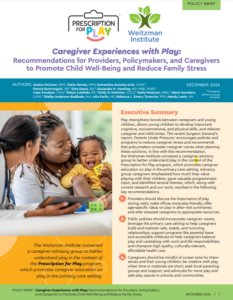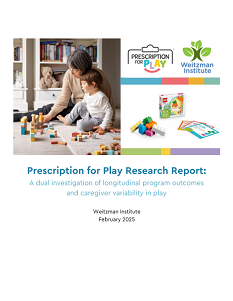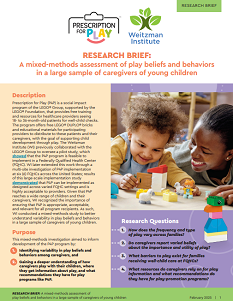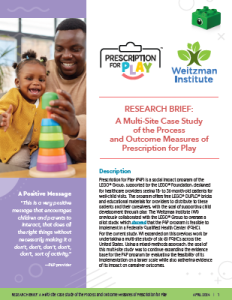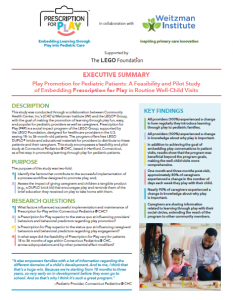Home » Prescription for Play
Prescription for Play
The Weitzman Institute is proud to partner with The LEGO® Group to support its Prescription for Play (P4P) program.
Prescription for Play is a social impact program of The LEGO® Group, supported by The LEGO® Foundation.
What is Prescription for Play?
Prescription for Play promotes learning through play by supplying free DUPLO® brick kits and educational materials to pediatric health care providers to deliver to 18-36-month-old patients during routine well-child visits.
Program resources include (free of charge):
- LEGO® DUPLO® brick kit
- Education Materials
- Virtual Hub of Program Resources and Trainings
- Implementation Toolkit (Manual, Sample Workflows and Scripts)
- CME Credits
- Technical Assistance
- Enduring Educational Content
- Program Support
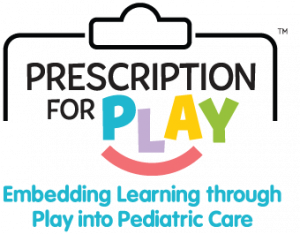
2024 Caregiver Advisory Group
The Prescription for Play program convened a 2024 Caregiver Advisory Group to gather the perspectives of parents and caregivers on experiences with play in their homes and communities. Their insights will inform the future of the program and led to several key recommendations.
Key Recommendations:
- Providers should discuss the importance of play during visits and offer age-specific ideas on play in after-visit summaries
- Public policies should incorporate caregiver voices and support parental leave, child care, and health care programs
- Caregivers should advocate for more play, be mindful of screen time, and seek local parenting education and support.
Research Findings
A dual investigation of longitudinal program outcomes and caregiver variability in play
Given that no prior research has examined the longitudinal impact of P4P on play-related outcomes, this pilot study sought to gather preliminary evidence on the relationship between P4P and child socioemotional development over time as well as changes in their home play environment. As part of this pilot study, caregivers who did and did not receive P4P during their child’s well-child check were surveyed at two separate time points to document group differences in socioemotional development and the home play environment over a 3-month period. The primary research questions included:
- 1. Does exposure to P4P relate to higher socioemotional competence in children over time?
- 2. Is P4P participation associated with changes in the number and types of play material available to children in their home environment?
A mixed-methods assessment of play beliefs and behaviors in a large sample of caregivers of young children
Due to Prescription for Play’s wide range of participants, the Weitzman Institute recognized the importance of ensuring that P4P is appropriate, acceptable, and relevant for all program recipients. As such, WI conducted a mixed-methods study to better understand variability in play beliefs and behaviors in a large sample of caregivers of young children.
Key Findings:
- Caregivers overwhelmingly report enjoying and prioritizing play with their children.
- Caregivers use play to teach their children skills and values.
- Caregivers are both cautious of and accepting towards technology.
- Caregivers face many barriers to play.
A Multi-Site Case Study of the Process and Outcome Measures of Prescription for Play
The Weitzman Institute conducted a multi-site study of six Federally Qualified Health Centers across the U.S. The goal of this study was to continue expanding the evidence base for the Prescription for Play program by evaluating the feasibility of its implementation on a larger scale while also gathering evidence of its impact on caregiver outcomes.
Key Findings:
- The P4P program can be implemented as designed within varied FQHC settings.
- Providers and clinic staff agree that the P4P program is important and enjoyable.
- The P4P program aligns with caregivers’ already positive views on play.
Past Research
Play Promotion for Pediatric Patients: A Feasibility and Pilot Study of Embedding Prescription for Play in Well-Child Visits
The Weitzman Institute conducted a pilot and feasibility study at Connecticut Pediatrics @ CHC in Hartford, Connecticut to:
- Identify the factors that contribute to the successful implementation of a process workflow designed to promote play; and
- Assess the impact of giving caregivers and children a tangible product (e.g., a LEGO® DUPLO® brick kit) that encourages play and reminds them of the brief education they received on play to take home with them.
For more information about Prescription for Play, contact Shelby Anderson-Badbade or Mandy Lamb or call us at (202) 471-1270

